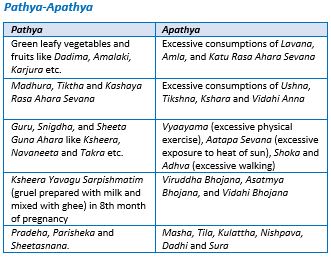Ayurvedic management of Immune Thrombocytopenic Purpura (ITP) in Pregnancy
Keywords:
ITP, Tiryakgata Rakthapitta, Autoantibodies, Samshamani Kriya.Abstract
Immune thrombocytopenic purpura (ITP) is an autoimmune disorder characterized by a low platelet count and mucocutaneous bleeding. Its highest frequency is in young women of reproductive age and it also occurs in 0.83 of 10,000 pregnancies. Pregnancy does not increase the incidence of ITP nor does it exacerbate a pre-existing disease. Sometimes platelet autoantibodies facilitate increased platelet destruction by the reticuloendothelial system especially the spleen and also these autoantibodies (IgG) can cross the placenta and place the foetus at risk for thrombocytopenia and may cause bleeding problems such as intracranial haemorrhage. Although some pregnant women with ITP may experience several maternal and foetal complications, in most cases even with a very low platelet count, there is neither maternal nor foetal morbidity or mortality. Corticosteroids are the first line of therapy in pregnant women or intravenous immune globulin is commonly used in steroid resistant patients. Other treatments such as intravenously administered anti-D and splenectomy during pregnancy have been reported. In Ayurveda, it can be correlated to Tiryak Rakthapitta, which is caused due to excessive consumption of Ushna, Tiktha and Amla Rasa. It is Tridoshaja Vyadhi and its manifestation will be subcutaneous bleeding. Since Apathya Ahara is also cause of any disease, Ayurveda highlights on diet and lifestyle changes along with Garbhini Paricharya to combat any such diseases seen in pregnancy. Further we can adopt Rasayana therapy and Samshamana Kriya, which are safe during pregnancy. Careful monitoring of the mother throughout pregnancy is critical to avoid risk to both the mother and neonate.
Downloads
References
Care A, Pavord S, Knight M, et al. Severe primary autoimmune thrombocytopenia in pregnancy: a national cohort study. BJOG 2018; 125:604-12.
Agnivesha, Charaka samhita of Charaka and Drdhabala with Vaidyamanorama commentary edited by Acharya Vidyadhar Shukla, Ravi Dutt Tripathi, Chaukhamba Sanskrit Pratishthan, Delhi, Reprint 2011, Nidanasthana, 2nd chapter.
Agnivesha, Charaka samhita of Charaka and Drdhabala with Vaidyamanorama commentary edited by Acharya Vidyadhar Shukla, Ravi Dutt Tripathi, Chaukhamba Sanskrit Pratishthan, Delhi, Reprint 2011, Nidanasthana, 2nd chapter, shloka no.4-6, p484-485.
Gautam M, Saha S, Bani S, Kaul A, Mishra S, Patil D, et al. Immunomodulatory activity of asparagus racemosus on systemic Th1/Th2 immunity: implications for immune adjuvant potential, Journal of ethnopharmacology, 2009;121:241-247
Agnivesha, Caraka samhita, edited by Vaidya Yadavji Trikamji Acharya, Shareera sthana, Chapter 8, Verse 32, Chowkambha surabharathi prakashana, varanasi, reprint 2013, p. 346.
Sushruta, Sushruta samhita, edited by Vaidya Yadavji Trikamji Acharya, Shareera sthana Chapter 10, Verse 4, Chowkambha sanskrit samsthan, varanasi, reprint 2013, p. 387.
Vagbhata, Astanga samgraha, edited by Shivaprasad Sharma, Shareera sthana, chapter 3, verse 2-11, Chowkambha sanskrit series office, varanasi, 2006. p.285
Agnivesha, Charaka samhita of Charaka and Drdhabala with Vaidyamanorama commentary edited by Acharya Vidyadhar Shukla, Ravi Dutt Tripathi, Chaukhamba Sanskrit Pratishthan, Delhi, Reprint 2011, Chikisthsasthana, 4th chapter, shloka no.62-72.
Chaudhary N, Siddiqui MB, Azmat S, Khatoon S. “Tinospora cordifolia: Ethnobotany, phytopharmacology and phytochemistry aspects”. International Journal of Pharmaceutical Science and Research, 2013; 3(1): 11-14. [Internet], [cited on 24 Nov], 2018
Shri. Bhavamisra, Bhavaprakasa Nighantu edited by Late Dr. G. S. Pandey Chaukhambha Bharati Academy Varanasi, Reprint, 2015; 372
Chunekar Krishnashastri, Pandey G.S. Bhavaprakash Nighantu. 2nd ed. Haritakyadi Varga 19-20. Varanasi: Choukhambha Bharati Academy. 2010, P.392
Chunekar Krishnashastri, Pandey G.S. Bhavaprakash Nighantu. 2nd ed. Haritakyadi Varga 19-20. Varanasi: Choukhambha Bharati Academy. 2010, P.5















